What is Reputation Marketing? Boost Your Business in 10 Steps [2025]
Índice
Next to Coca-Cola and Pepsi, Red Bull is the most recognizable and valuable beverage brand in the world. During the last 30 days, it was mentioned online over 40,000 times, reaching nearly 1 billion people! What’s the secret of Red Bull’s outstanding success? Well, the answer lies in reputation marketing.
Resumen rápido:
– Reputation marketing is the practice of promoting a brand, business, or person by using elements like positive reviews, customer testimonials, ratings, social proof, user-generated content on social media, and much more to build trust and attract new customers.
– It involves highlighting favorable feedback while managing online perceptions to create a strong & credible brand image.
– Reputation marketing differs from traditional marketing by focusing on promoting positive feedback and aligning with core brand values, unlike traditional marketing, which centers on company messaging.
– The ultimate goal of reputation marketing is to turn it into a competitive advantage.
Everyone’s aiming for an excellent reputation.
No surprise!
There’s nothing sweeter for a business owner to read all these good online reviews and praises about the brand’s reputation.
Unfortunately, negative reviews happen even to the best of us. But there are many ways to turn negative feedback into good and enforce positive brand content.
In this article, you’ll learn everything about online reputation marketing strategy:
- How to use it to your advantage
- Essential tools
- Real-life examples
- & so much more!
¡Que aproveche!
¿Qué es el marketing de reputación?
El marketing de reputación se refiere a la strategic effort of shaping and influencing how others see a brand, business, or individual.
It merges reputation management and brand marketing.
This ensures that the brand is seen in a positive light and that its positive reputation is leveraged in promotional efforts.
In today’s digital age, where:
- Customer engagement is vital
- Consumers frequently rely on online reviews
- People check testimonials before purchasing or choosing a service
Reputation marketing becomes crucial for businesses of all sizes!
Boost your reputation marketing with Brand24!
What efforts can reputation marketing include?
- Responding to negative reviews and customer feedback.
- Sharing positive brand content on social media.
- Any PR activities like interviews in local news or collabs with brands from your niche.
- Taking care of search engine optimization and what pops up when someone googles your brand’s name.
- Having a pre-established reputation marketing strategy with key actions for pr crises.
With that said, let’s take action!
You probably wonder how to create an effective reputation marketing strategy that can be implemented to improve your company’s reputation.
Here’s my guide on creating a strong reputation marketing strategy:
¿Cómo crear una estrategia de marketing de reputación para su empresa? 10 pasos
A strong reputation is a valuable marketing asset that can drive business growth and customer trust.
Here’s what you need to consider when creating your reputation marketing strategy:
01 Check the current reputation
Antes de iniciar cualquier planificación, debe realizar una auditoría exhaustiva de la presencia y la reputación en línea actuales de su marca. De acuerdo, pero ¿cómo hacerlo en la práctica?
La forma más cómoda y eficaz es utilizar los adecuados herramientas de seguimiento de medios. ¿Por qué?
Porque estas herramientas ofrecen funcionalidades completas que le permiten comprobar múltiples métricas de reputación en tiempo real, lo que le permite comprender lo que funciona a su favor (y lo que no).
I’ll show you it in the example of Brand24, the leading seguimiento de los medios de comunicación tool. I like this software because of its Funciones basadas en IA, UX amigabley seguimiento de las menciones procedentes de múltiples fuentes:
- Plataformas de medios sociales como Facebook, Instagram, X (Twitter), YouTube, TikTok, LinkedIn, Reddit, Twitch y Telegram;
- Sitios de noticias, blogs, podcasts, plataformas de vídeo, boletines y otros sitios web;
- Sitios de reseñas en línea (TripAdvisor, Yelp, Booking.com, App Store, Google Play y Trustpilot).
Pruebe la mejor herramienta de marketing de reputación
Lo más importante es que Brand24 rastrea tanto las menciones etiquetadas como las no etiquetadas. ¿Por qué es importante?
Porque Internet está lleno de menciones no etiquetadas que pasan desapercibidas!
Each time someone discusses your brand without tagging it, you risk missing valuable feedback or potential issues.
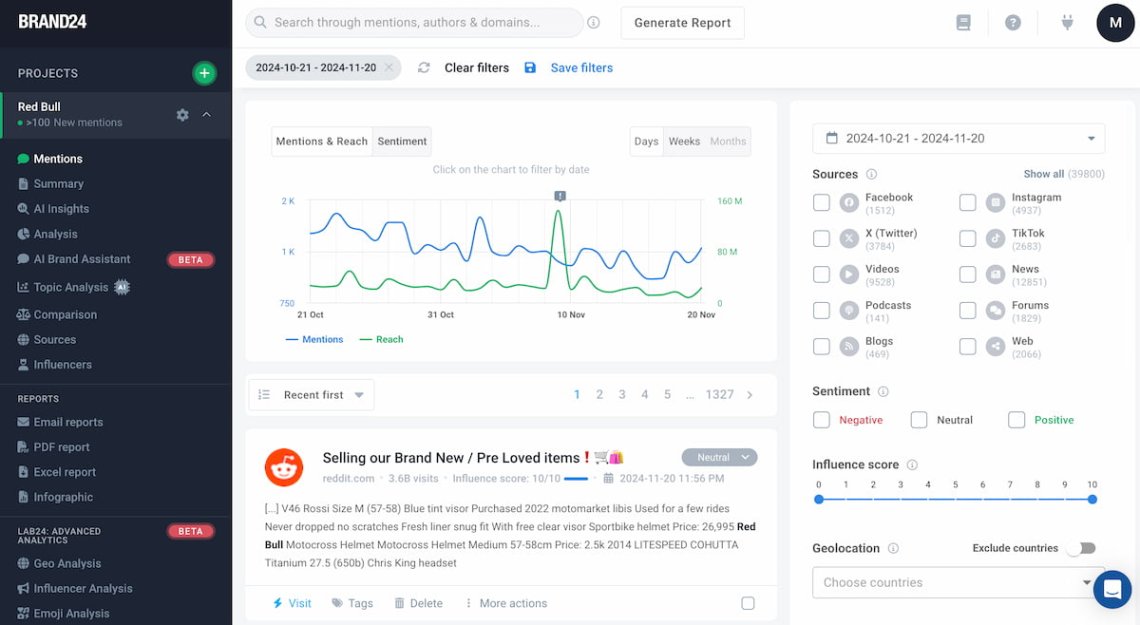
So, how do you check your current brand’s reputation?
- Análisis de opiniones
Hacer un seguimiento del volumen y el alcance de las menciones de su marca está muy bien, pero definitivamente no es suficiente para evaluar su reputación actual.
Lo que realmente importa son las emociones que impulsan a la gente a escribir sobre su marca. Y aquí, las análisis de opiniones ¡entra en escena!
Como su nombre indica, el análisis de sentimiento es un método de análisis de texto para identificar su intención.
Su objetivo es reconocer automáticamente los sentimientos ocultos tras las palabras y categorizarlos en uno de estos tres tipos: positivo, negativo y neutro.
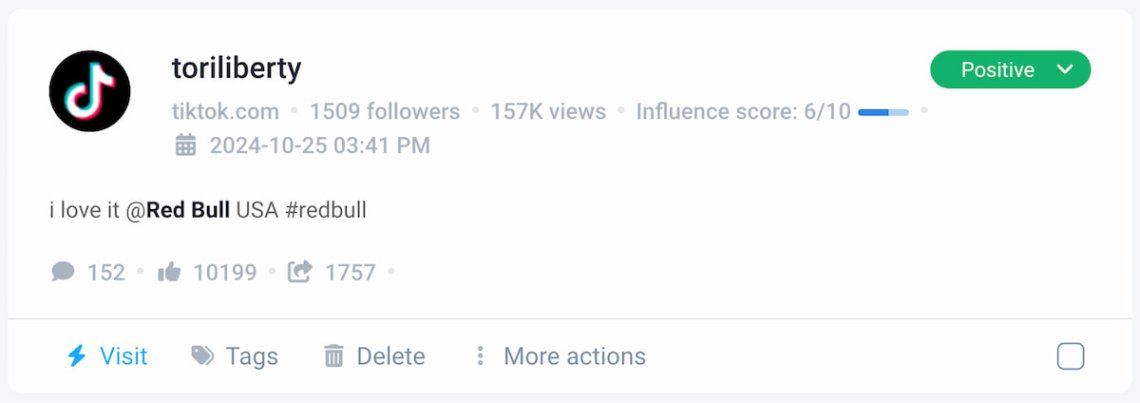
You can analyze each mention one by one, but it’s quite time-consuming – especially if you get hundreds or even thousands of them.
Thankfully, Brand24 presents all your mentions on an intuitive chart. It’s super simple – si la línea verde sube, aumenta el sentimiento positivo; si la línea roja sube, aumenta el sentimiento negativo.
Just look at the example below:
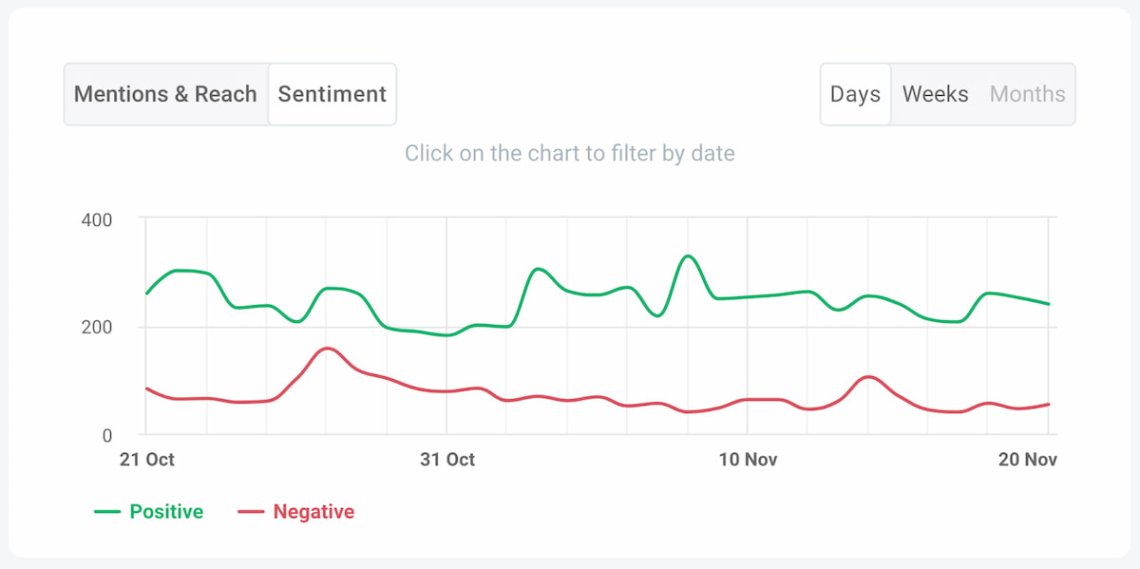
It’s Red Bull’s sentiment analysis chart below. The brand obviously goes well in terms of its reputation!
- Compruebe su puntuación de presencia
The second handy metric to check whether your reputation marketing efforts are enough is the Puntuación de presencia.
As its name suggests, this metric shows your brand’s presence online. The more mentions and reach of your brand mentions, the higher your Presence Score.
Y como habrá adivinado, aumentar su visibilidad en línea es esencial para la reputación de una empresa.

Compruebe ahora su análisis de opiniones y su puntuación de presencia.
02 Set clear goals
You cannot plan a reputation marketing strategy without setting any goals.
So, determine what you want to achieve!
It can be things like:
- Improving online ratings
- Increasing positive reviews
- Enhancing brand perception in specific areas
Tracking your reputation marketing goals is crucial, as it can directly impact business performance and help you measure the effectiveness of your strategy.
Establezca sus objetivos de marketing de reputación con Brand24
De acuerdo, pero ¿cómo descubrir qué áreas pueden aportarle el mayor ROI en lo que respecta a su marketing de reputación?
Bueno, hay docenas de consejos que podría darte. Pero voy a simplificar una cosa: ¡pregúntale a AI!
We live in the era of artificial intelligence. So don’t be scared to use it!
However, instead of relying on generic AI chatbots, focus on specialized AI tools designed for reputation marketing. ¿Por qué?
Porque estas herramientas pueden acceder a datos detallados y específicos de la marca, lo que les permite ofrecer perspectivas más precisas y personalizadas.
Por ejemplo, el Asistente de marca AI works like ChatGPT but accesses real data from your media monitoring project
I asked a question: “What should Red Bull focus on if the brand wants to improve its reputation marketing?”.
In just 15 seconds, the Brand Assistant provided me with 6 actionable tips to enhance Red Bull’s reputation marketing efforts.
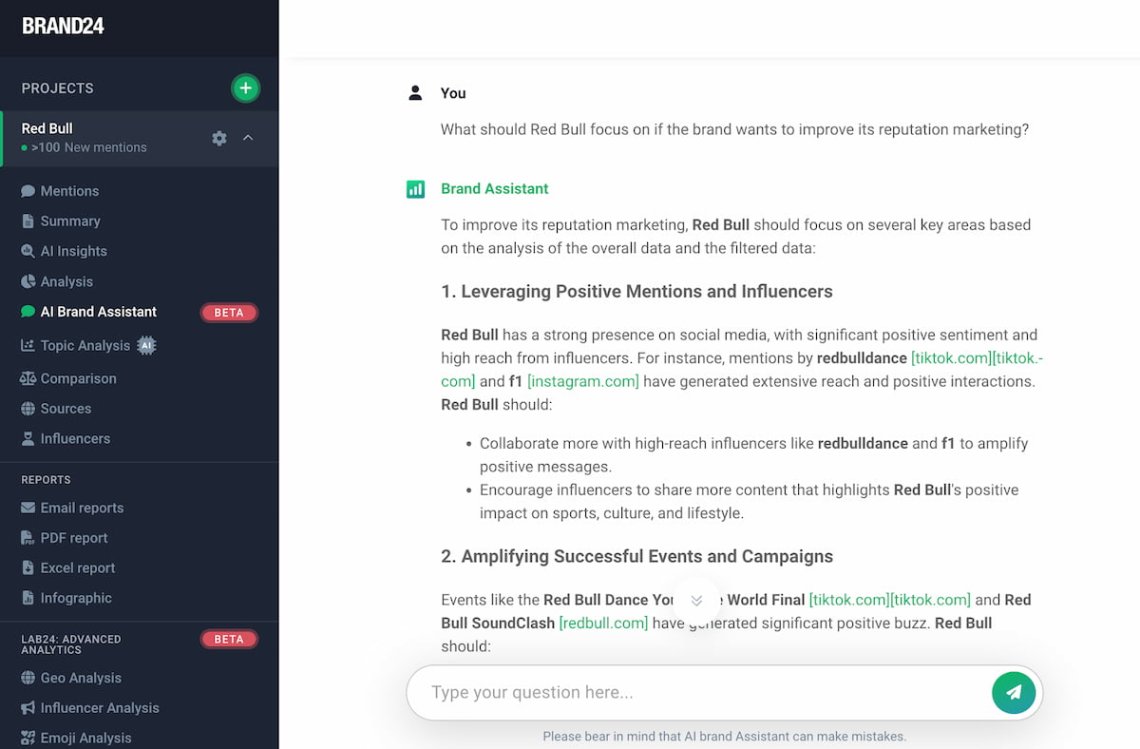
Each tip was precisely explained and data-backed.
Awesome!
Acceda a AI Brand Assistant
03 Fomentar las opiniones de los clientes
Reviews are one of the most important factors in improving your brand’s online presence. They inform you how real people perceive your products or services.
De hecho, según la Estudio BrightLocal50% de los consumidores confían en las opiniones en línea tanto como en las recomendaciones personales de amigos y familiares.
Especially small businesses should invest in encouraging satisfied customers to write positive mentions, as there are not a lot of them available online yet.
It’s simple. If your brand is not well known (yet), your potential customers will likely look for any opinions about your company online.
Plus, positive customer reviews on third-party review platforms like Google Business Profile, Yelp, and Trustpilot can significantly influence prospective customers’ decisions, as these platforms are seen as more credible and trustworthy sources.
The more positive reviews you gain, the more likely people are to purchase your products.
Vea las opiniones de la gente sobre su marca.
04 Amplifying positive brand content
Según Centro de Marketing de Influencers, 72% of consumers consider customer reviews and testimonials more credible than when a company or brand talks about itself.
¿Qué significa para usted?
To use the full potential of positive reviews, you must showcase them:
- Highlight positive testimonials and reviews on your website.
- Share them in your social media posts, newsletters, and other marketing materials
- & amplify their reach and impact!
Here’s a real-life example of good online reputation marketing:
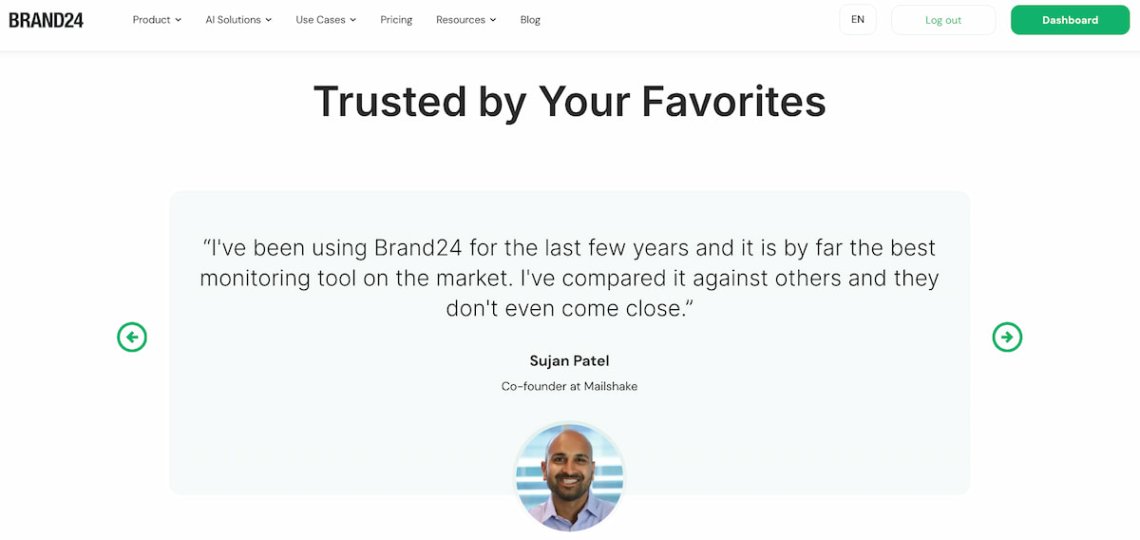
Showcase studies by creating compelling stories or content around customer success.
Trust me, it works great, especially in B2B marketing!
Don’t stop there and add positive feedback into your marketing materials on social media platforms.
Según el estudio Cómo está cambiando el comportamiento de los compradoresLos anuncios con reseñas consiguen un porcentaje de clics 4 veces superior y son dos veces más baratos en términos de coste por adquisición y coste por clic.
Pruebe la mejor herramienta de marketing de reputación
05 Comprométase con su público
Engaging with customers on social media platforms, review sites, and other online forums is extremely important.
And there are many stats proving that!
Basta con mencionar que las marcas que se comprometen con sus clientes en las redes sociales pueden reducir su coste por contacto en 83%
Simply put, responding to both positive and negative feedback shared in reviews, comments, and messages shows that a brand really values its customers’ opinions.
In fact, customers expect businesses to respond promptly to both positive and negative feedback, which is crucial for effective reputation marketing.
Additionally, being responsive adds to your genuineness and shows there are real people behind the brand (especially in the times of AI replacing humans wherever possible).
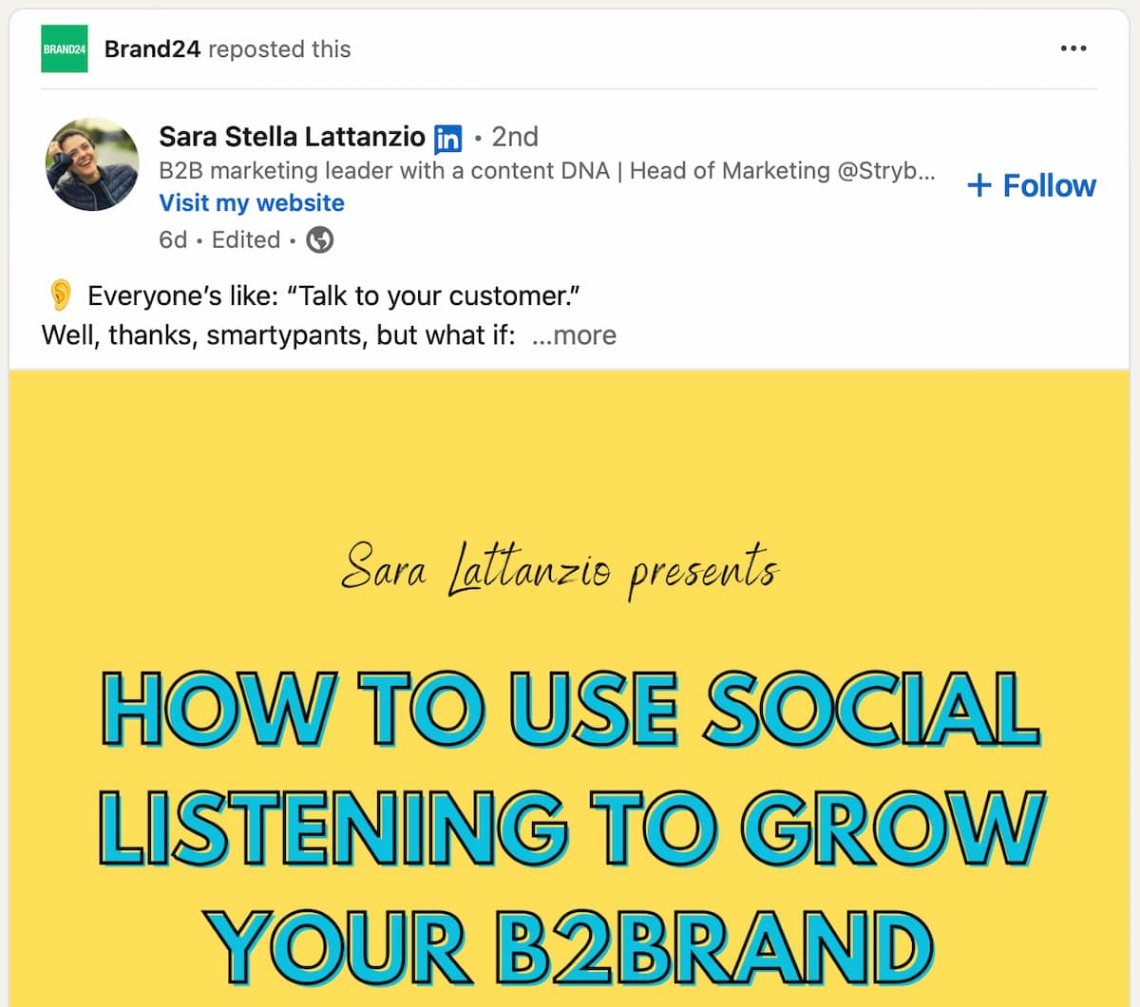
Always praise people who talk positively about you on social media platforms!
There’s nothing worse than leaving user-generated content unattended.
And it doesn’t really matter if the fostered review is positive or negative.
According to the abovementioned BrightLocal study, 88% of customers are likely to use a business based on how it responds to online reviews.
Potencie su marketing de reputación con Brand24
06 Abordar los comentarios negativos de forma constructiva
Negative customer feedback has two sides:
- It can be a chance to improve your product or service
- It can also harm your reputation.
How you handle it matters the most.
Considere estas estadísticas clave:
- 52% de los clientes esperan una respuesta en una semana;
- 96% de los consumidores buscan específicamente opiniones negativas before deciding to click “Buy”.
Significa dos cosas.
En primer lugar, debe responder rápidamente a los comentarios negativos.
En segundo lugar, cuando respondas, hazlo con comprensión, discúlpate si es necesario y ofrece una solución clara.
Si lo hace, no sólo resolverá el problema, sino que también mostrará a otros clientes potenciales cómo gestiona las críticas.
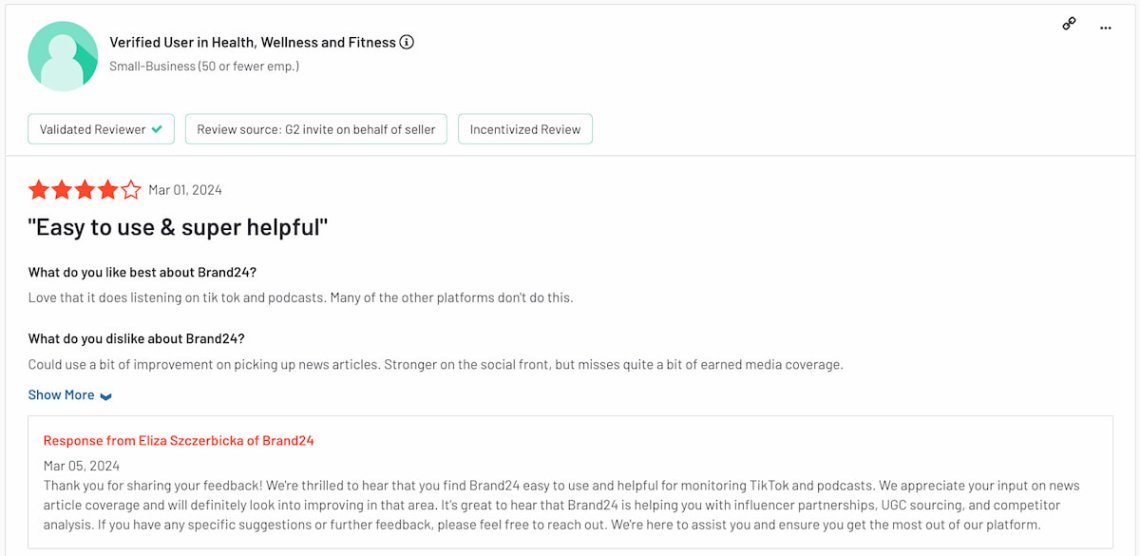
Plus, a strategy you should use to prevent negative feedback is simply encouraging happy customers to leave positive reviews and showcasing them in your marketing.
In the end, remember Warren Buffet’s words: feedback is a gift. Even a negative one, because it creates chance to build a better business.
If you struggle with managing negative reviews, check our article: ¿Cómo responder a las críticas negativas?
07 Construya su nicho de especialización
Convertirse en un experto en su sector da un fuerte impulso a su reputación en línea.
When people see you as a trusted authority, they are more likely to:
- Value your opinions
- Recommend your brand
- Buy your products or services
To build niche expertise, you should consistently share valuable insights.
¿Cómo hacerlo?
1. Creación de contenidos
Your website is one of the most powerful brand assets for your reputation marketing efforts.
¿Por qué?
- First of all, it’s totally under your control. You can create and distribute content highlighting the brand’s positive aspects, values, achievements, community involvement, and customer success stories.
- En segundo lugar, los contenidos de alta calidad tienen el potencial de convertirse en virales, y eso significa aumentar su reputación.
- Thirdly, creating valuable and quality content boosts your search engine optimization and visibilidad de marca en motores de búsqueda como Google.
If your blog posts appear on competitive search engine ranking pages, it proves your authority within your niche and boosts your brand’s online reputation.
2. Seminarios en línea
Hosting webinars is another excellent way to establish your niche expertise and enhance your online reputation.
¿Por qué?
- Webinars allow you to share in-depth knowledge directly with your audience,
- Educate people about your product,
- Engage with them in real time,
- Showcase your expertise in a more personal and interactive way.
By offering valuable, actionable insights, you strengthen your reputation, build trust, and foster relationships with your audience.
Additionally, you can invite industry experts or influencers to co-host your webinars.
This not only adds credibility to your event but also expands your reach when they share you on social media.

Speaking about collaboration…
- Asociaciones
Las asociaciones también pueden desempeñar un papel crucial en la gestión de la reputación.
Collaborate with social media influencers, industry leaders, or other brands to co-create content or initiatives that can enhance the brand’s reputation.
Ensure that all collaborations and content reflect and promote your brand values to build trust and consistency.
Cuando se hace bien, marketing de influencers can generate a lot of positive recognition on social media, amplifying positive brand content.
Pruebe la mejor herramienta de marketing de reputación
08 Educar a los empleados
Lo crea o no, educar a sus empleados es crucial para el marketing de reputación.
Your employees can be powerful brand advocates.
Encourage them to share positive experiences and insights about the company on their personal networks.
Happy employees are a stamp of approval on your operations, and good marca de empleador también puede formar parte de sus esfuerzos de marketing de reputación.
Power up your reputation marketing!
09 Desarrollar un plan de gestión de crisis
Encuesta mundial sobre crisis y capacidad de recuperación de PwC shows that 96% of organizations experienced disruptions or crises in the period of 2021 – 2023.
And it’s worth underlining that 9 out of 10 of these crises were unrelated to the pandemic.
Mientras tanto, TrustPilot’s research muestra que una reputación de marca positiva es el factor más importante para los consumidores a la hora de elegir una empresa.
Estas estadísticas dejan clara una cosa: your brand’s reputation is everything… and crises can happen anytime to anyone.
Por eso, disponer de un comunicación de crisis plan es esencial.
Prepare un gestión de crisis de reputación de marca para hacer frente con eficacia a posibles amenazas y garantizar una respuesta rápida y coordinada cuando surjan problemas.
A reputation marketing software can be a great help for that:
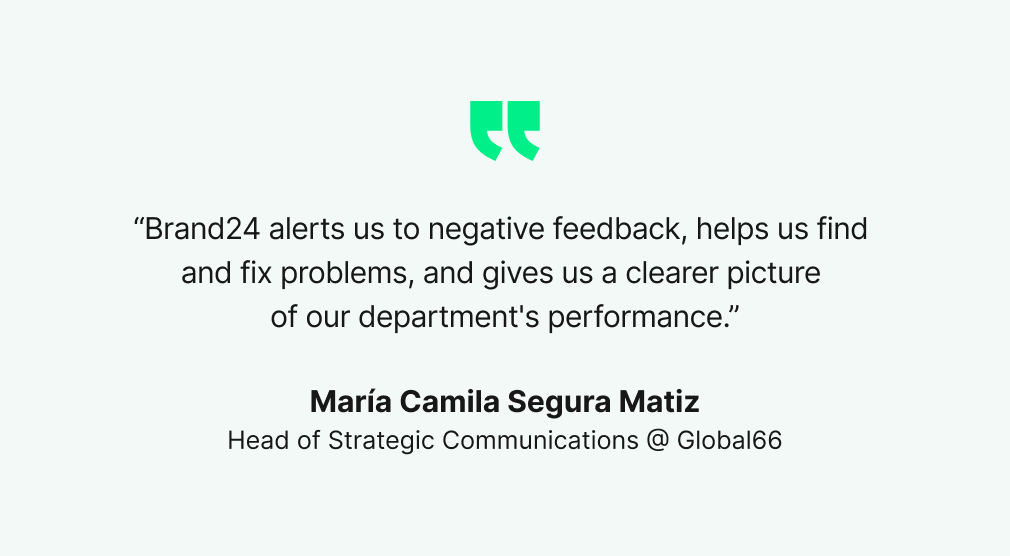
You can read the whole story in this <strong>estudio monográfico</strong>.
Prepárese para una crisis inminente.
10 Monitor your online reputation continuously
Reputation marketing is not an episodic but a continuous process of assessments and improvements.
All good strategies need analyzing and adjusting, as it is an ongoing process.
Por lo tanto, debe hacer de la supervisión de su reputación en línea un hábito.
Regular monitoring not only helps you respond to feedback but also plays a crucial role in maintaining and enhancing your brand’s image across digital channels.
You can use reputation marketing software like Brand24 to measure progress toward objectives and adjust tactics as needed.
Vale, listillo, pero ¿cómo?
You can do it manually by analyzing your sentiment (I described it in detail in the first step).
But if you need a more automated and comprehensive approach, use the power of Inteligencia Artificial.
In short, it’s an AI-powered tab showing the most important conclusions, charts and metrics in one place.
Al hablar de vigilar su reputación, debe prestar especial atención a Tendencias y Recomendaciones.
In practice, you can use info from Tendencias to stay one step ahead:
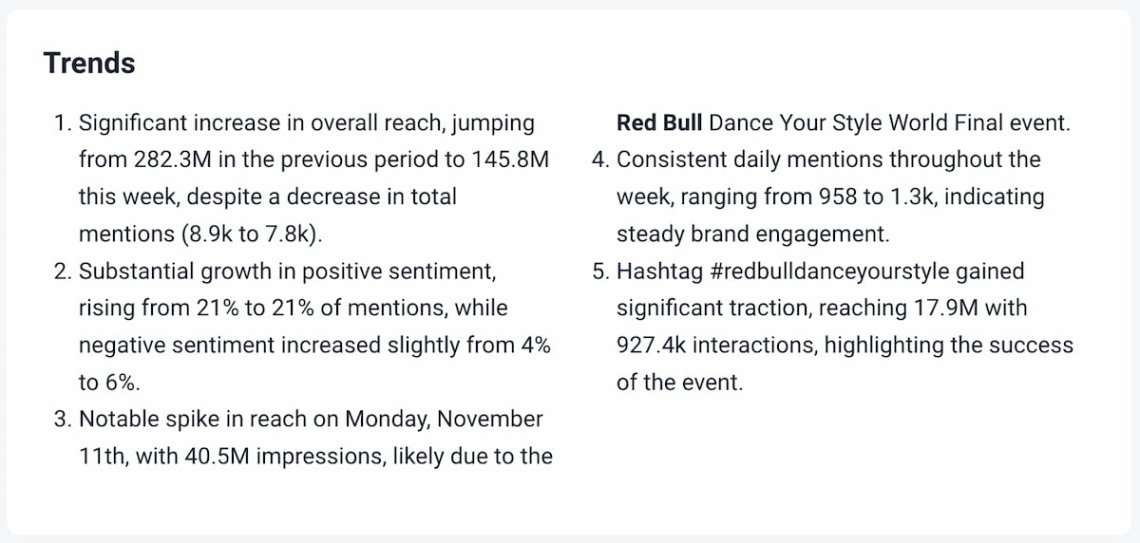
En cuanto a Recomendaciones, these are data-driven suggestions on how you can improve your reputation by enhancing your existing campaigns.
Use them wisely!
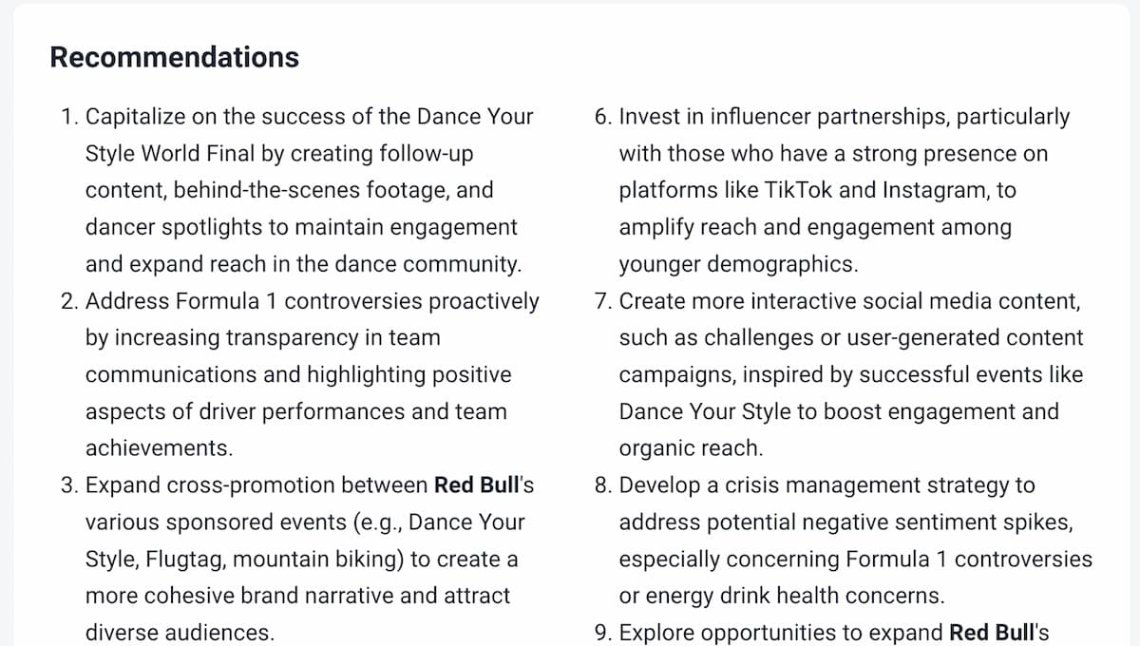
Utilice el poder de la IA para mejorar su reputación.
Why is reputation marketing important?
Puede que sea una pregunta obvia, pero hay algunos factores adicionales que debería implementar en la gestión de la reputación en su estrategia empresarial.
Here’s a list of the 10 most important reasons for taking care of a reputation marketing strategy:
- Confianza y credibilidad. Una reputación positiva genera confianza. Los clientes que confían en una marca son más propensos a comprarle, fidelizarse e incluso pagar más.
- Influir en las decisiones de compra. Consumers often research brands before making purchasing decisions. Positive reviews and a good reputation can sway decisions in a brand’s favor.
- Referencias de boca en boca. Una buena reputación impulsa marketing boca a boca. Los clientes satisfechos son más propensos a recomendar la marca a otras personas.
- Ventaja competitiva: En mercados saturados, una buena reputación puede diferenciar a una marca de sus competidores, convirtiéndola en la opción preferida de los consumidores.
- Mayor fidelidad de los clientes. Las marcas con una reputación positiva suelen experimentar una mayor fidelidad y retención de clientes.
- Resiliencia en las crisis. Las marcas con una reputación sólida están mejor posicionadas para resistir las crisis. A menudo reciben el beneficio de la duda y pueden recuperarse más rápidamente.
- Beneficios financieros. Una buena reputación puede conducir a un aumento de las ventas y la rentabilidad. Por el contrario, una mala reputación puede acarrear importantes pérdidas económicas.
- Atracción y retención de talentos. A las empresas con buena reputación les resulta más fácil atraer y retener a empleados cualificados.
- Menores costes de comercialización. Mantener una buena reputación puede reducir los costes de marketing y de captación de clientes, ya que el boca a boca positivo y la confianza alivian la necesidad de campañas promocionales agresivas.
- Relaciones con las partes interesadas. Una reputación positiva facilita unas mejores relaciones con las partes interesadas, incluidos socios, proveedores e inversores.
To sum up:
Reputation is key in marketing and business. It underpins almost every aspect of consumer interaction with a brand and can significantly impact a company’s long-term success.
Boost your reputation marketing!
PREGUNTAS FRECUENTES
¿Qué es la estrategia de reputación?
A reputation marketing strategy refers to a planned and structured approach to shaping and maintaining the perception of a brand, company, or individual in the eyes of its stakeholders.
Esta estrategia es esencial para generar confianza, gestionar las crisis, diferenciarse de la competencia y alcanzar objetivos empresariales a largo plazo.
Monitor your online reputation in real-time!
¿Cuál es la diferencia entre marketing y gestión de la reputación?
- Reputation management is about maintaining and protecting a brand’s image.
- Reputation marketing differs as it’s about using and enhancing that image to better achieve marketing objectives.
In practice, while reputation management focuses on monitoring and responding to reviews, feedback, and mentions to maintain or repair a brand’s image, reputation marketing goes further.
Promueve y amplifica activamente los elementos positivos de la reputación para impulsar los esfuerzos de marketing.
You might also be interested in: 6 consejos de expertos para dominar la gestión de la reputación de marca
¿Qué es un ejemplo de reputación?
“Reputation” refers to the collective perception or assessment of a brand, company, individual, or entity based on past actions, behaviors, or performance.
Here are some examples to illustrate reputation:
- Apple is known for its design-centric approach and user-friendly products. The company has a reputation for producing high-quality, innovative tech devices.
- Por otra parte, Volkswagen sufrió un revés en su reputación con el escándalo "Dieselgate", cuando se descubrió que manipulaba las pruebas de emisiones.
Although they’ve taken steps to recover, the incident left a mark on their reputation for some time.
Prevent a PR crisis!
¿Qué es la reputación de marca?
La reputación de marca, a menudo denominada simplemente reputación de marca, is the perception and collective impression that consumers and other stakeholders have about a brand.
It is based on their experiences, interactions, and exposure to that brand’s messaging, actions, products, and services over time.
It’s the intersection of a company’s branding efforts (how it wants to be perceived) and people’s real-world opinions and feelings about the company.
Power up your reputation marketing!
Conclusión
It is more than just a strategy. Reputation marketing builds trust, attracts customers, and drives long-term business success.
Escucha social herramientas like Brand24 ensure you stay ahead of potential issues and maximize your efforts.
You must accept the fact that crises are almost inevitable.
But with a well-thought-out crisis communication plan and a proactive approach, you can turn challenges into opportunities for growth.
Si da prioridad a su reputación y la integra en su estrategia global de marketing, podrá crear una impresión positiva y duradera que genere confianza, inspire fidelidad a sus clientes y le permita crecer.
Principales conclusiones:
- El marketing de la reputación no es un esfuerzo puntual, sino un proceso continuo. Requiere un planteamiento estratégico y un seguimiento periódico.
- Incluso los comentarios negativos pueden ser un regalo – it provides valuable insights to improve and strengthen your business as well as enhance your notoriedad de marca.
- Mostrar casos de éxito y estudios de casos para destacar los resultados del mundo real, generar confianza y ofrecer resultados concretos.
- Utilice herramientas de IA como Brand24 para evaluar su reputación actual y supervisar sus esfuerzos de marketing de reputación.
Comience ahora la prueba gratuita de 14 días de Brand24 y mejore su estrategia de marketing de reputación.
Artículos relacionados


![Reputación en redes sociales: Estrategia, definición y consejos [Guía para 2025]](https://brand24.com/blog/app/uploads/2024/06/social_media_reputation-600x335.webp)
![¿Qué es la monitorización de la reputación de marca? ¡Herramientas, consejos y mucho más! [2025]](https://brand24.com/blog/app/uploads/2022/12/Brand-Reputation-Monitoring-Tools@2x-600x335.webp)
![Reputación digital: Estrategia, definición y consejos [Guía para 2025]](https://brand24.com/blog/app/uploads/2024/05/digital_reputation@2x-600x335.webp)
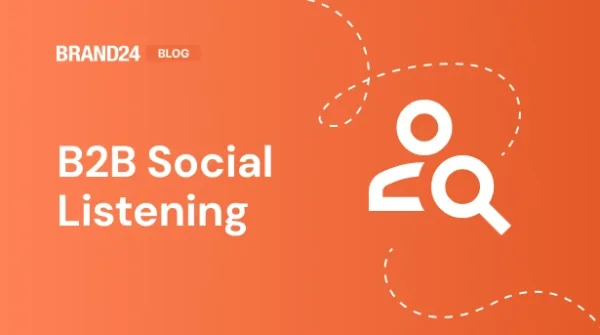

![¿Cómo medir el rendimiento del marketing? [2025]](https://brand24.com/blog/app/uploads/2024/04/marketing_performance-600x335.webp)
![La reputación de la empresa: Estrategia y consejos [Guía para 2025]](https://brand24.com/blog/app/uploads/2024/06/Company_reputation-600x335.webp)